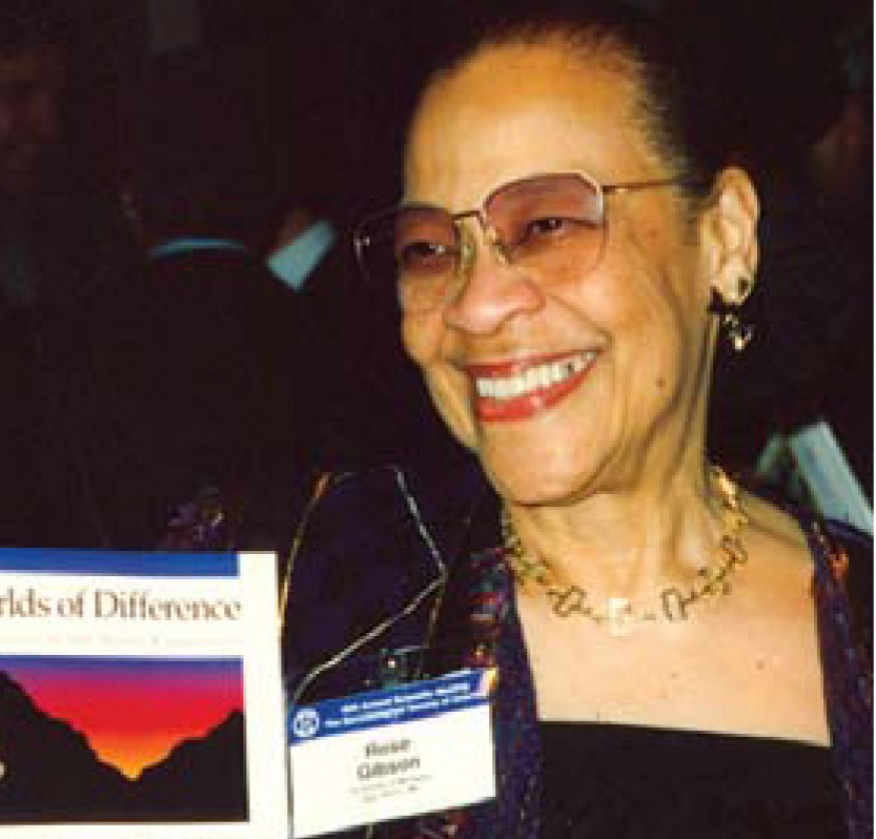Rose Campbell Gibson’s contributions to the field of gerontology remain as relevant today as they were in the 1980s and 1990s, when she conducted her pioneering research on minority aging. Her colleagues remember her for the strong, rigorous methodological skills that informed every aspect of her innovative research. Gibson came to the School to build a program in aging, and the program’s strength is part of her legacy.
Gibson’s parents raised her in Detroit with her three older sisters (all of whom became school teachers or principals), who not only spoiled but also encouraged her. Math and science were her favorite subjects in school, and she began her studies at the University of Michigan preparing for a career in medicine. She met and married Ralph Gibson, himself a pioneer as a clinical psychologist, who later became an assistant dean in the U-M Medical School.
Gibson postponed her medical studies for nearly twenty years in order to raise two sons. When she returned to U-M, she decided to pursue graduate studies in the School of Education, taking courses in statistics and research with Professor Betty Morrison, who, Gibson recalls, “kindled in me a love of quantitative research methods.” She received a Distinguished Dissertation Award in 1977 and went on to become a lecturer there.
Her interest in research in minority aging was sparked in 1978 by collaborations with Harold Johnson, then director of the Institute of Gerontology and later dean of the School of Social Work, and James Jackson at the Institute for Social Research (now director). Two postdoctoral fellowships in aging research methods followed. Her research explored the relationships between age and health and various socioeconomic factors over the lifespan, comparing White and Black populations.
When Johnson became dean of the School in 1981, he made it a goal to build a program in aging. Looking for a distinguished academician whose focus was on the minority elderly, he naturally turned to Gibson and persuaded her to join the faculty in 1985. Gibson taught courses in research methods and the sociology of aging. She remarks that her work was enriched by the interdisciplinary collaborations of the School of Social Work faculty.
Gibson’s contributions to aging research are extensive. She authored Blacks in an Aging Society (1986) and co-authored Worlds of Difference: Inequality in the Aging Experience (1994; now in its third edition) with Eleanor Stoller. She served as editor-in-chief of The Gerontologist, the largest multidisciplinary research journal on aging, from 1992 to 1996. Gibson was also a frequent consultant on minority aging research at local, state, national, and international levels, as well as a visiting professor at several universities.
According to James Jackson, Gibson “made seminal contributions to the study of aging-related processes. Her work on multiple points of mortality crossover opened an entirely new way of thinking about the minority mortality advantage in older age. Her work on self-rated health and the ways that Blacks and Whites may construct different meaning systems is very important and is being paid more attention today than ever before. She is a truly gifted theorist and researcher in the field whose work will remain significant over many decades.”
Gibson retired in 1997 and she and her husband moved to East Hampton, New York, to be near their son Ralph, a physician. It was hard to leave their roots in Ann Arbor, but she “came to the realization that it’s another life change.” Sadly, Gibson’s husband died a year later. But she remains active and engaged as a grandmother of four, a community volunteer, an avid reader, a computer buff, and a traveler, often visiting her son John, a lawyer in Southern California.
Although Gibson has truly retired from her professional interests, remarking, “If you say ‘no’ enough times, no one asks you any more,” she is justifiably proud of her accomplishments, as is the School of Social Work.
—Robin Adelson Little works at the U-M Exhibit Museum of Natural History. She is also a freelance writer and past editor of Ongoing
